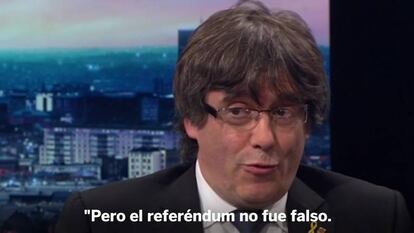Ex-Catalan premier Puigdemont on Flemish TV: “I don’t believe in martyrs”
The politician, who fled Spain to avoid arrest, is stepping up his public appearances ahead of the first anniversary of the independence referendum


When former Catalan premier Carles Puigdemont, who is living in self-imposed exile in Belgium after leading a unilateral secession attempt, appears on TV shows and panel discussions at various European forums, he is often met with softball questions. But not always.
On Tuesday, the politician faced a critical guest on the Flemish public television station, VRT. Geert Noels, an economist, asked Puigdemont why he fled the country instead of facing arrest and pre-trial custody “with your friends,” a reference to other separatist politicians who were charged with rebellion, sedition and misuse of public funds over the secession push, and who face an upcoming court case in Spain.
You should not have organized a fake referendum but a real one, and the outcome would have served for something
Geert Noels, economist
Puigdemont, who recently published a book in which he cites Nelson Mandela and Martin Luther King Jr. as his main sources of inspiration, replied: “Because if I were in prison I could not be inside this studio. I don’t believe in martyrs, I believe in democracy and the separation of powers.” To which Noels retorted: “Yes, but you would probably be more powerful in jail than you are in a studio.”
With just days to go before the first anniversary of an independence referendum held by Puigdemont’s government in violation of Spanish constitutional laws, Noels also told the ousted leader that if he did not want to be a martyr, “you should not have organized a fake referendum, but a real one, and the outcome would have served for something. But it was done in an amateuristic [sic] way and now you’ve lost a lot of credibility. And once you lose credibility, you can’t expect the whole population to be right behind you.”
“The referendum was not a fake, it was real,” replied Puigdemont.
Aware that the nearly 1,400 kilometers that separate him from Barcelona could end up diluting his political influence over Catalonia – where a new premier, Quim Torra, has taken his place following an election in December – Puigdemont has been multiplying his public appearances, particularly in the days prior to October 1. He recently gave a keynote address at a Flemish university, he has presented a book based on his conversations with a Belgian journalist, and on Wednesday he traveled to Munich to participate in a talk about Catalan independence.
In July, the Spanish Supreme Court rejected Puigdemont’s extradition from Germany because it would have been solely on the charge of misuse of funds, rather than on the more serious charge of rebellion, which the German court refused to uphold. The Spanish judge in charge of the case has also withdrawn the European arrest warrant issued against Puigdemont and five other politicians who fled Spain to avoid detention for their role in last year’s secessionist drive. The Spanish arrest warrant remains in place, however.
English version by Susana Urra.
Tu suscripción se está usando en otro dispositivo
¿Quieres añadir otro usuario a tu suscripción?
Si continúas leyendo en este dispositivo, no se podrá leer en el otro.
FlechaTu suscripción se está usando en otro dispositivo y solo puedes acceder a EL PAÍS desde un dispositivo a la vez.
Si quieres compartir tu cuenta, cambia tu suscripción a la modalidad Premium, así podrás añadir otro usuario. Cada uno accederá con su propia cuenta de email, lo que os permitirá personalizar vuestra experiencia en EL PAÍS.
¿Tienes una suscripción de empresa? Accede aquí para contratar más cuentas.
En el caso de no saber quién está usando tu cuenta, te recomendamos cambiar tu contraseña aquí.
Si decides continuar compartiendo tu cuenta, este mensaje se mostrará en tu dispositivo y en el de la otra persona que está usando tu cuenta de forma indefinida, afectando a tu experiencia de lectura. Puedes consultar aquí los términos y condiciones de la suscripción digital.








































